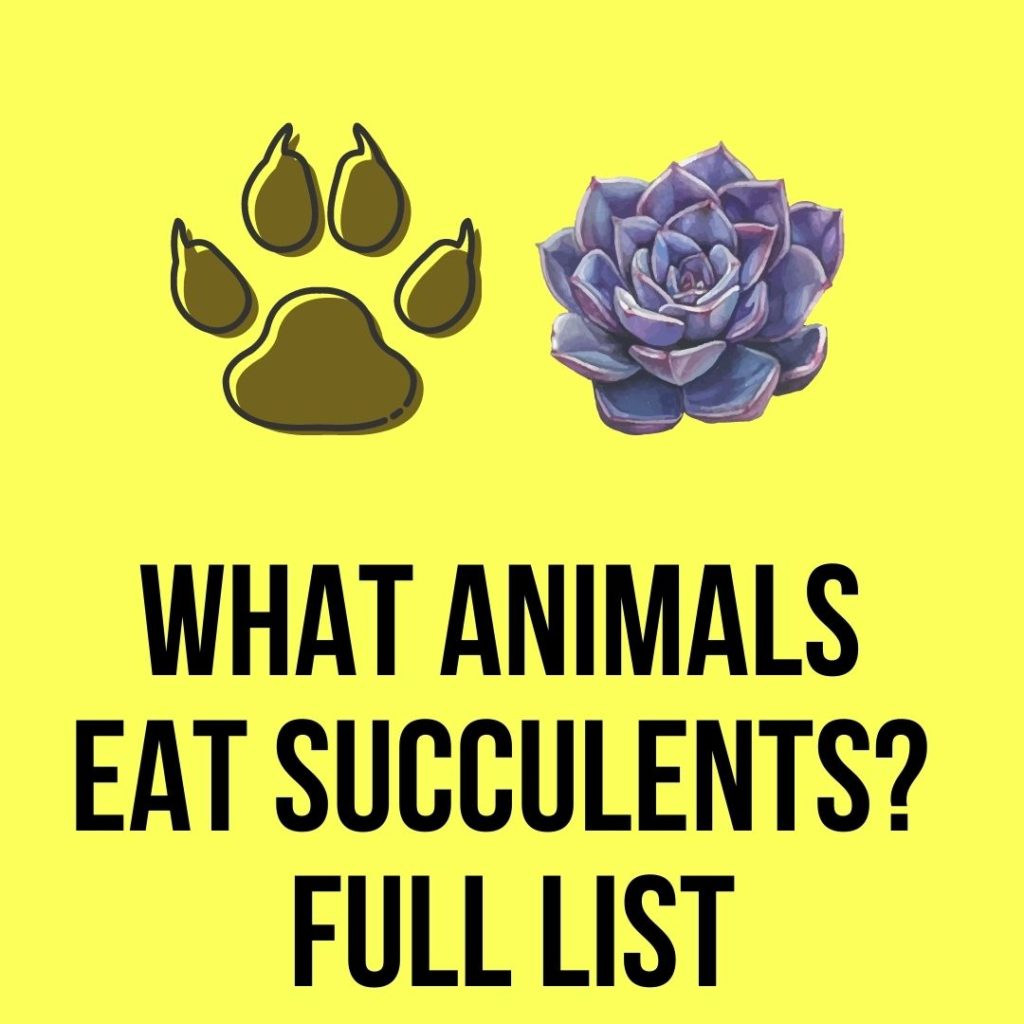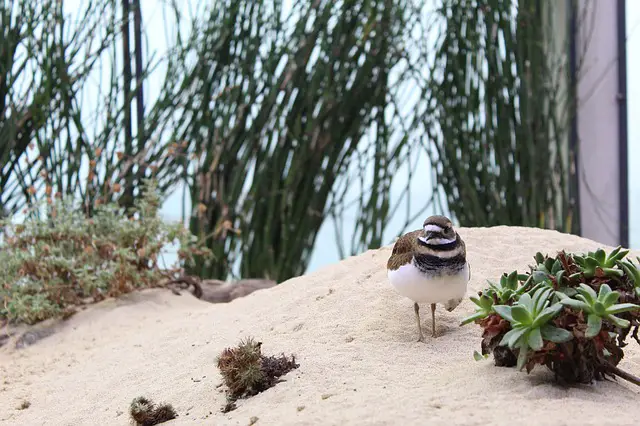Succulents are plants that can survive in dry places. Their main characteristic is the fleshy leaves and stems, and these fleshy parts can store water in them and ensure the plants survive.
These plants are unique, and almost 60 plant families fall under succulents. So, succulents can be pretty diverse and unique looking. And today we will talk about what animals eat succulents.
Succulents
At present, succulents are quite famous. They can be seen in homes, workspaces, and various other places. These plants are easy to look after and can survive in indoor situations. There are many beautiful-looking succulents on the market, and they are also really cheap. For these reasons, the demand for succulents is on the rise.
Succulents bring a part of nature indoors, and many appreciate the plants for this aspect. The most common succulents seen indoors are Jade Plant, Aloe Vera, Panda Plant, Roseum, Snake Plant, etc. These plants are seen indoors, but some succulents prefer an outdoor environment.
Succulents can be very different from each other. There is plenty of succulents owner who makes succulents garden, and these gardens mainly consist of outdoor succulents. There can be Agave, Aeonium, Crassula, Dudleya, Echeveria, etc.

Succulents and Animals
Now no matter what type of succulents you own, is there a chance that animals can eat them? If animals attack them, you need to know how to repel them. In this article, we will see what animals eat succulents and how you can save your plants from them.
Succulents, in general, are not that lucrative to animals. It makes sense knowing that they are mainly filled with liquids. However, if animals need water or are forced by nature, they can eat succulents.
The list of animals that can eat succulents is not that long. If you think about small animals, it can be mollusks—for example, snails, slugs, etc. Some pests eat succulents, like Aphids. If you are thinking of wild animals, there are squirrels and possums.
In the case of pets, cats have been reported to nibble on succulents. There is also another possibility, and it is birds. Some birds can attack your succulents for water.
Mollusks Eating Succulents
Mollusks are soft-bodied animals that live in aquatic or damp places. The most common example of mollusks can be snails, slugs, oysters, clams, etc. And if you are into gardening, you are aware of snails and slugs. These slow and harmless-looking animals can be dangerous for your succulents.
They are not particularly picky and eat any vegetation they find. So succulents are also on their menu. The terrifying thing about these creatures is that they can multiply by big numbers. They can lay 20-100 eggs several times a year and live up to 5 years.
These creatures will chomp any greenery they can find and will do massive damage to your succulents. However, you will notice the attack very early and can take appropriate steps.
The natural deterrent to snails and slugs is eggshells. Crush eggshells in tiny bits and spread them around the base of the plants. Slugs and snails have very soft bodies, and these prickly eggshell fragments will poke them. So, they will avoid the terrain and will not come near your plant.
You can also try making a beer trap. The yeast in beers attracts snails and slugs. They will come running to these traps instead of your plants. Then you can simply remove them from the vicinity.

Pests Eating Succulents
Succulents suffer fewer pests attacks compared to other plants. The usual enemy for succulents is Aphids. They are tiny bugs that can suck the liquid in your succulents. They do not seem like a threat at first, but if not, dealt with can be bad for your succulents.
Aphids can be green, black, or yellow. You can remove them by hand. However, If the infestation is bad, just spray 70% isopropyl alcohol. Isopropyl alcohol is a sure-fire way to eliminate many pests, including Aphids. If it does not work, you can try using Safer Soap.
Another pest that can suck the juice out of your succulents is spider mites. These creatures are tiny and red. They are pretty easy to spot if your succulents are green. If you spot them, deal with them as soon as possible. The quickest way is to spray them with isopropyl alcohol. The alcohol is safe for your succulents and will not harm them.
Birds Eating Succulents
Birds will not do significant damage to your succulents. They will peck the plants just to taste them and sometimes use them as water alternatives. The succulents will have small holes instead of big chunks missing if it is birds.
There is no way to avoid birds if your succulent is planted outside. However, they will not do much damage, and if you keep a water feeder in your garden, they should avoid your plants. They should not be your primary concern if you have succulents.
Squirrels Eating Succulents
Squirrels can be a nightmare for any garden owner. These cute little diggers will eat and chew plants, but they are not fond of succulents. Though if there is a food source, they will go through your lovely succulents.
Squirrel attacks are very easy to distinguish. They dig, chew anything they can get their paws on, and the rampage they commit is visible. The annoying thing is that once they find a garden or plant, they do not leave it alone. They will damage your plants pretty severely and leave the remains of them.
The easiest way to deal with squirrels is to have a pet dog or a cat. Your pets can chase them whenever they are in your garden, and they will stop coming into the area. However, not everyone has a pet. So, there are ways, such as using peppermints. Peppermints are a natural deterrent for squirrels. They do not like the smell at all. So spraying peppermint oil around your garden can help immensely.
You can also purchase predator urine. Predators like coyotes mark their territory with urine, and squirrels avoid those areas. So, buying them and spraying them around your garden is an excellent way to keep it squirrel-free.
There is also a bone meal. They are a mixture of animal bones and remains. The smell of dead animals will keep herbivores like squirrels away. Though they also smell harmful to humans but are an excellent calcium fertilizer for your soil.
Cats Eating Succulents
Your pet can nibble on succulents from time to time. Cats are curious and active creatures; they occasionally nibble on vegetation. So, succulents can also serve as their plaything. Sometimes they might also scratch the fleshy leaves just for their amusement.
An excellent way to make sure your cats do not harm your succulents is to keep them apart. You can try putting your succulents in small cages, where they can be watered and can get sunlight. You can also try putting your succulents in places your cat cannot reach, for example, on high shelves, hanging baskets, etc.
If you cannot keep them apart, just spray vinegar on your succulents. The vinegar will not harm your plant and keep your feline friend away from the tree. Cats have very sensitive noses, and they do not like the smell of vinegar.
Possums Eating Succulents
Possums are animals that are native to Australia. They are also found in the Indonesian islands of New Guinea and Sulawesi. These omnivores can be the most dangerous match for your succulents. But if you do not live in the areas they are native to, your plants are safe from their attack.
They are omnivores, and they will eat bugs, fruits, plants, anything that they find edible. They can go through your garden every night and leave it in tatters. These little animals eat the tender growth of succulents and can kill your succulents.
If you live in areas where they live and a significant part of your plant goes missing, they are your culprit. They can eat 2 to 3 trees in a single night.
The easiest way to avoid them is by putting your plants in high places that cannot be climbed by possums. There is another way, that is to use garlic. Possums hate garlic, so mix chopped garlic with water and spray them on your plants. Repeat this process every four days and also after you water them.
Closure
Succulents are plants that can live for a long time if cared for properly. They are quite hardy plants and can survive in most conditions. However, damage from animals can be harmful to them. So, it is essential you look after your plants and do what is necessary to help them survive.
![What Animals Eat Succulents? Easy Answer [2023]](https://gardeningforu.com/wp-content/uploads/2022/04/What-Animals-Eat-Succulents.jpg)